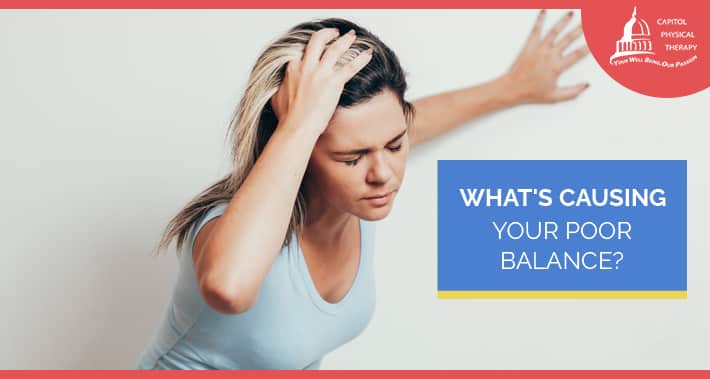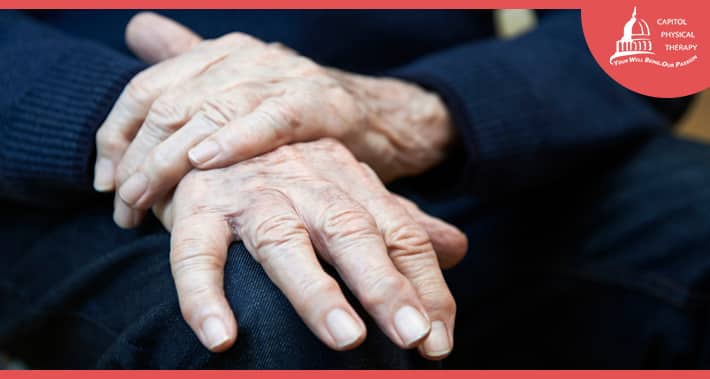
Many of your essential functions involve balance in some way.
Whether you’re doing yoga, pilates, cycling, or other indoor or outdoor activities, balance is a key component.
Your vestibular system is the system responsible for giving you the sense of balance and the ability to orient yourself spatially.
There are numerous conditions that can affect your vestibular system and cause difficulty maintaining balance.
Aside from navigating slippery sidewalks in the winter or that tricky part on your favorite hike, you might not think about your balance very much.
When you do notice issues with your balance, you may worry about what that means for your ability to function independently.
You may also consider how it will affect your day to day activities.
At Capitol Physical Therapy we offer fall prevention therapy and physical therapy for vestibular issues to help lower your risk of falling if you’re having balance issues.
There are multiple factors that can contribute to poor balance, or increase your risk of developing balance issues.
Let’s take a closer look at what balance issues are and what can contribute to them.
What Are Balance Issues?
Feeling dizzy, lightheaded, or as though the room is spinning, are all common symptoms of poor balance.
They are all signs that you may be experiencing vertigo.
Vertigo is common condition, with almost 40% of U.S. adults having experienced vertigo at least once in their lifetime.
These symptoms can happen at any time and place.
Whether you’re sitting at a desk, standing, running, or even laying down in bed.
Having these symptoms doesn’t necessarily mean you’re actually about to fall over or lose your balance.
They might just give you the perception that you may be falling over or that the world is spinning.
These symptoms can sometimes be related to your circulatory system or your vestibular system, which is located in your inner ear.
Old age also increases your risk of developing balance issues as well as increases your risk of falls.
Changes in vision can also influence your balance, meaning your balance can get worse in darker or more congested environments.
This is because you use your vision to navigate your environment and figure out where you are in relation to that environment.
Sensation changes in your feet can also worsen your balance.
These sensory issues can be the result of diabetes, circulation issues, medications, or nerve injuries.
Issues with your feet can cause your brain to not be aware of where and how you’re stepping, increasing your risk of tripping.
Lastly, balance can be impacted by how quickly and accurately your body is able to respond to a stimulus, whether expected or unexpected.
What Causes Balance Issues?
There are a number of conditions that can cause balance issues.
These conditions can impact your ability to navigate the world as you did previously.
Everyday activities can become more difficult.
All your sensory organs connected to balance need to function properly for your balance to remain intact.
Balance issues are most common when you have damage to your inner ear.
Depending on the cause, balance issues can cause a variety of symptoms.
These include problems with your posture, dizziness, spinning, floating sensations, confusion, or feeling like you may fall.
Let’s have a closer look at some of the conditions that commonly affect your balance.
Benign Paroxysmal Positional Vertigo (BPPV)
Benign paroxysmal positional vertigo, or BPPV, is a form of non-life threatening vertigo.
It’s the most common form of vertigo.
BPPV occurs when calcium crystals, which form naturally in the inner ear, shift out of place.
The role of these crystals is to help maintain your balance and make you sensitive to gravity.
Your sense of gravity may be impacted if you lay in a certain way, which can accidentally trigger vertigo.
Regularly experiencing vertigo may interfere with your daily activities.
You may require accommodations at work due to this condition, which can also help prevent injuries associated with falling.
Some of the known causes of benign paroxysmal position vertigo include traumatic brain injury.
This can be true of both milder traumatic brain injuries like concussions, or more serious ones.
In either case, it can cause damage to your inner ear.
Aging, ear infections, and traumatic brain injury can all increase your risk of vertigo because they loosen your inner ear.
Aging is a risk factor because seniors may fall more often due to conditions like dementia and stroke.
However, in many cases the cause of BPPV is unknown.
Common symptoms of BPPV include:
- Nausea
- Vomiting
- Dizziness
- Lightheadedness
- Blurred vision
- Poor balance
- Sense that your environment is spinning
More severe symptoms can include:
- Severe headache
- Numbness
- Weakness or pain in the legs or arms
- Decreased level of consciousness
- Loss of hearing
- Difficulty speaking
- Fever
- Loss of vision, or double vision
If you have any of the above symptoms, paired with vertigo or dizziness, consider seeing a vestibular physical therapist right away.
Here at Capitol Physical Therapy, we offer physical therapy treatments for benign paroxysmal positional vertigo, as well as medical screening to know when it’s necessary to refer you to a physician.

Multiple Sclerosis
Multiple sclerosis is a type of neurological disorder.
It’s a chronic illness affecting the central nervous system, including the brain and spinal cord.
Myelin, an insulating layer around your nerves, sends signals to your sensory organs and is responsible for the speed of movements that involve the senses.
The breakdown of myelin in multiple sclerosis results in poor communication from your brain to the rest of the body, and can lead to damaged and deteriorated nerves.
Due to these communication challenges, it can result in poor balance, vertigo, and trouble walking.
Other symptoms include:
- Trouble speaking and swallowing
- Tiredness, even after a full night’s sleep
- Sexual issues, such as trouble orgasming
- Memory issues
- Mental health difficulties, like depression
If you have multiple sclerosis, physical therapy may help you to regain strength in your muscles.
Traumatic Brain Injury
Traumatic brain injuries are injuries which affect brain function.
This can include injuries due to a fall, car crash, or other sudden blow or jolt to the head.
These injuries can result in the brain moving back and forth inside the skull, resulting in damage such as a contusion or bruise.
They can cause immense pain in your shoulders, lower back, upper back and other muscles and bones.
You may be familiar with concussions, a milder traumatic brain injury, but more serious ones are possible as well.
Symptoms of brain injuries can include poor balance, trouble standing and walking, trouble regulating emotions, and trouble with your memory.
Parkinson’s Disease
Parkinson’s disease is a chronic condition, which is caused by a loss of nerve cells, resulting in low levels of dopamine being produced.
This lack of dopamine affects a number of areas including mood, executive functioning, and movement.
The cause of Parkinson’s is not known, but there are risk factors.
Risk factors include sex (men are more likely to develop than women), age, and family history of the disease.
Some of the symptoms of Parkinson’s, which can affect balance include:
- Slowed or delayed movements
- Tremors (shaking) in your hands or feet
- Trouble walking
- Poor coordination
Vestibular Issues
Your vestibular system is responsible for helping you know where your head is in space.
A system of tubes within your inner ears, this system gives your brain information on how your head moves.
It’s also responsible for balance, posture, tracking things with your eyes, even with your body in motion, and stability.
Issues connected to your vestibular system include:
- Vertigo
- Dizziness
- Blurred vision
- Motion sickness
- Light sensitivity
- Neck pain and stiffness
- Trouble focusing
Causes of vestibular disorders include:
- Ear infections
- Traumatic brain injury
- Certain medications
- Inner ear problems
Other Conditions
While we’ve looked at some of the conditions that commonly affect your balance, this list is by no means comprehensive.
Some other conditions which can result in poor balance include:
- Persistent postural perceptual dizziness
- Meniere’s disease
- Ramsay Hunt syndrome
- Migraines
Book Your Appointment With Capitol Physical Therapy Today
Are you dealing with vertigo after experiencing an ear infection?
Or lingering feelings of dizziness and lightheadedness due to a head injury?
Or maybe you’re worried about an elderly parent with Parkinson’s disease or multiple sclerosis and are looking to find ways to help them manage their symptoms or prevent falls?
At Capitol Physical Therapy, we can help.
We provide physical therapy in Washington DC and the surrounding area, we can help with fall prevention, gait training, vestibular issues, and other conditions which can affect balance.
Contact us today for more information or to set up a consultation.
1331 H St NW #200,
Washington, DC 20005
- https://g.page/capitolptdc
9560 Pennsylvania Ave. # 202,
Upper Marlboro, MD 20772
- https://goo.gl/maps/zjL4NnnuThRhrcS86
Capitol Physical Therapy offers orthopedic and other pain related solutions, with our versitile team of physical therapists in Washington, DC